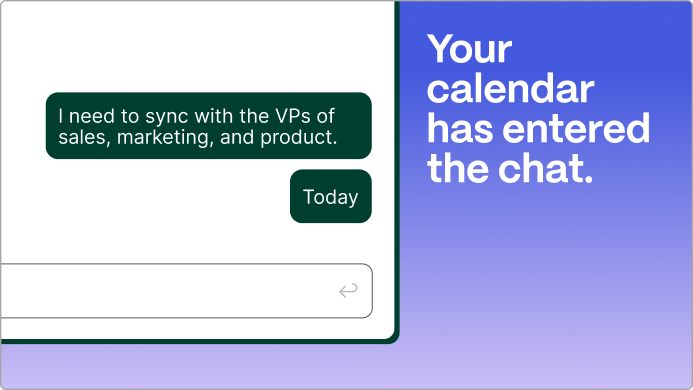Throughout 2018 and 2019 books like Make Time, Indistractible, and Atomic Habits hammered home how distracted we all are, and how unhappy and ineffective it’s making us. They railed against open-office floor plans and push notifications and even recommended wearing a plain old wristwatch so you can see what time it is without getting sucked into a vortex of mindless scrolling.
While the year 2020 is the perfect time to prioritize focus, there’s a lot more to focus than saying no to distractions. It’s also about saying yes to better habits and choices. The stage is perfectly set for 2020 to be the year we finally get serious about making time for what matters and ruthlessly cutting out everything that doesn’t serve our goals.
In that spirit, here are five tips for finding focus at work in 2020 that each take 20 minutes or less.
1. Schedule time to optimize your calendar every week
Are you making time for what matters to you?
Whether the answer is yes, no, or somewhere in between isn’t what matters most. The important thing here is to have a clear answer.
We recommend setting aside at 15-20 minutes at the start of your week to proactively plan what you want to accomplish before the end of the week and 15-20 minutes at the end of each week to journal what you accomplished and what got in your way.
In the first sit-down, write down what you want and need to accomplish. In the second, write down what worked and what didn’t throughout the week.
This process will teach you a lot about your priorities, work habits, and roadblocks. Plus, it’ll give you a list of your accomplishments that may come in handy when it comes time for your performance review.
2. Lightly audit your calendar
It’s 10 am, you’re at work, and a calendar invite comes in. If you’re like most of us, you’ll likely accept it as long as that time is free. If you feel like most of your time goes to reactive work, try a lightweight calendar audit to help you find opportunities to spend your time more effectively.
Start by choosing a representative week on your calendar and printing that week (or saving it as a PDF you can mark up). Then you’ll want to rate each of your meetings 1-5 in order of importance.
- Mission-critical events you absolutely have to attend
- Events you need to attend to do your job and no one else can attend for you
- Someone needs to attend these, but with enough lead time and training, someone else could attend these for you
- Events that straddle the line between necessary and nice-to-have
- Events that have no real impact on your job
Type 5 meetings are easy wins. Cancel them or push them off. They should never be recurring. Scrutinize type 4 meetings very closely. This is a good area to push back in a nice way to see if you're truly needed. These should almost never be recurring. Type 3 takes some work, but can really pay off. This isn't just how you open up more time for yourself now, but on an ongoing basis. By learning how to better train your team and delegate, you open up more opportunities for your team to grow while giving you more tools on how to juggle expanding responsibilities. You can evaluate type 2 meetings for frequency and timing. For example, maybe not all one-on-ones need be weekly.

While the lightweight calendar audit shouldn’t take you long, we created Calendar Insights to help make auditing your calendar easier.
3. Automate calendar management as much as possible
One of the best ways to reclaim your time is to automate as many manual processes as possible. For example, are you having to check your personal calendar and your work calendar to schedule appointments and meetings? Or are you constantly having to reschedule double-booked meetings? Integrate your work and personal calendars. If you’re worried about privacy, you can also set your work calendar to display your personal calendar events as “busy” with no other details. You can also consider coding different events with various colors so you can see what kinds of events you have coming up at a glance without having to read the title or details.
Clockwise makes syncing your personal and work calendars and color-coding your events super easy with Personal Calendar Sync and Color Coding.
4. Schedule heads-down work time
When you’re done reviewing your priorities and the beginning of the week, consider reviewing your calendar as well. How much time do you have open for heads-down, focused work?
Harvard Business Review recommends you take stock of what they call time fragmentation. “This is based on the idea that making any real progress on thoughtful work requires more than a 30-minute increment of time, and that it takes 15 minutes to return to a productive state after an interruption.” In their analysis, they found context switching cost one large software company more than 450 hours per year, per manager.
This is where blocking off time for focus can help. Proactively setting aside time for deeply focused, proactive work prevents you from saying yes to too many reactive requests from others. To make this process less manual, we offer Focus Time events. Turning it on helps you visualize how much time you have for focused work by automatically creating Focus Time events on your calendar that show as “busy.” These dynamic calendar events are updated in real-time as your calendar changes, so you always have an up-to-date view of your Focus Time.
5. Make time for what matters
Finally, it’s important to remember that life isn’t all about productivity. In 2020, use the gains in time and energy from your better habits to do the things that bring you joy.
Schedule a coffee with a current coworker you’d like to get to know better, or former coworker you want to catch up with. Step away from your computer. Take a walk outside. Go to your kid’s baseball game. Ironically, many of the things we think of as distractions are actually key to enhancing our creativity.
Going forward
Every year, the pace of work quickens, opportunities to connect deeply shrink, and distractions multiply. It’s up to us to stand athwart fragmented time, yelling “Stop!”
Hopefully, these tips will help you make 2020 your most focused year yet.






